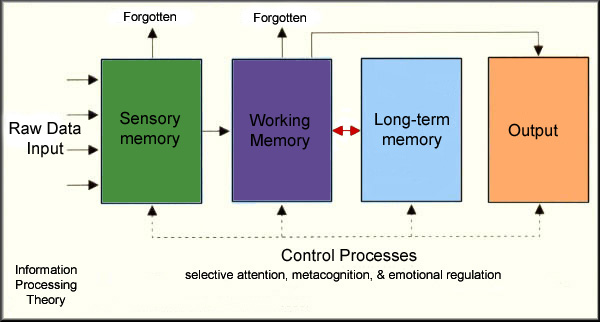|
Ψ Good thinking involves:
• considering evidence
• planning ahead
• thinking logically
• formulating alternative hypotheses
• being consistent
Ψ Information Processing
• Information processing theory is a theory of learning that focuses on the steps of thinking; such as sorting, categorizing, storing, and retrieving.

• From stimulus to response, from input to output thinking is analogous to operating a computer. Solid arrows indicate the pathways for transfer of information, broken arrows indicate overriding control processes that determine how & when transfer occurs. As with a computer, innate speed & capacity are important, however, the crucial factor is the program held in memory. The program is what is most developed in middle childhood.
Parts:
 Sensory register – A memory system that functions for only a fraction of a second, retaining a fleeting impression of a stimulus on a particular sense organ. Meaningful information is transferred to working memory for further analysis. Sensory register – A memory system that functions for only a fraction of a second, retaining a fleeting impression of a stimulus on a particular sense organ. Meaningful information is transferred to working memory for further analysis.
 "Working memory - The part of memory that handles current, conscious mental activity. a.k.a. short-term memory. "Working memory - The part of memory that handles current, conscious mental activity. a.k.a. short-term memory.
In 1956 American psychologist George Miller reviewed many experiments on memory span & concluded that people could hold an average of seven items in short-term memory. He referred to this limit as “the magical number seven, plus or minus two” because the results of the studies were so consistent. More recent studies have attempted to separate true storage capacity from processing capacity by using tests more complex than memory span. These studies have estimated a somewhat lower short-term storage capacity than did the earlier experiments. People can overcome such storage limitations by grouping information into chunks, or meaningful units.
 Long-term memory - The part of memory that stores information for days months or years. Long-term memory - The part of memory that stores information for days months or years.
 Control Processes - The part of the information-processing system that regulates the analysis and flow of information, including memory and retrieval strategies, selective attention, and rules or strategies for problem solving. Control Processes - The part of the information-processing system that regulates the analysis and flow of information, including memory and retrieval strategies, selective attention, and rules or strategies for problem solving.
Memory
Children show a dramatic improvement in memory between the ages of 7 & 11. They are better able to remember essential facts with almost no forgetting. Selective attention and metacognition are 2 of the factors behind the improvement.
 Selective attention: the ability to screen out distractions & concentrate on relevant information. Selective attention: the ability to screen out distractions & concentrate on relevant information.
 Metacognition: the ability to evaluate a cognitive task to determine how best to accomplish it, & then to monitor one’s performance. "thinking about thinking" Metacognition: the ability to evaluate a cognitive task to determine how best to accomplish it, & then to monitor one’s performance. "thinking about thinking"
|





















